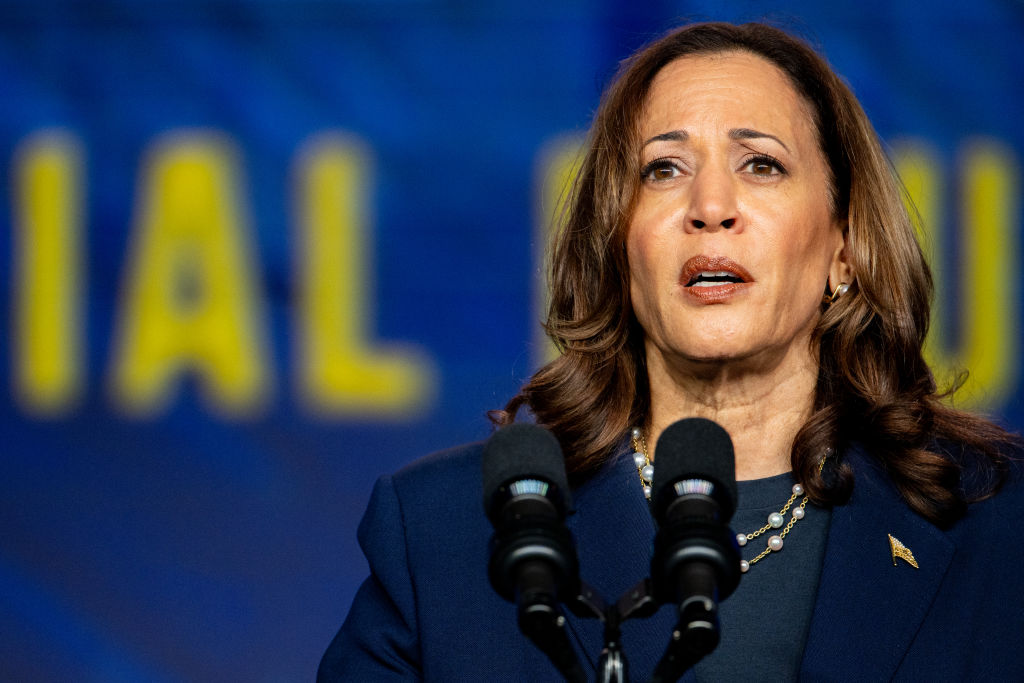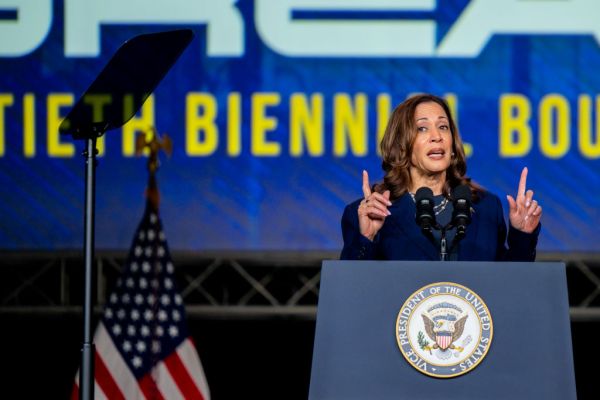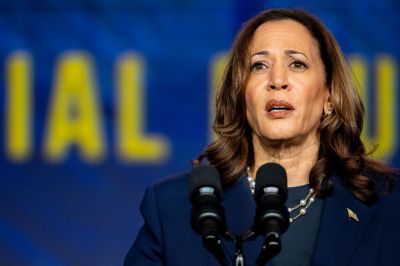In the earliest days of the Biden-Harris administration, Kamala Harris’ team made it clear that she was intent on beefing up her foreign policy bona fides. President Joe Biden’s people wanted her to be an “emissary on the international stage” knowing full well that the president’s age might preclude him from a second term.
When the administration began, Politico noted that, “While she served on the Intelligence Committee during her four years in the U.S. Senate, foreign affairs was not a major policy focus either during her time in Washington or her presidential campaign.” Then, revealing what Biden sources had intended for her, it reported, “Biden wants Harris to catch up and has urged her to engage with foreign leaders directly and develop her own rapport with key U.S. partners.” It went on: “Another, more strategic reason for the encouragement: as the heir apparent to the Democratic Party—especially if Biden, who is 78 years old, doesn’t run for re-election—Harris needs to bulk up her foreign policy expertise, and fast.”
Ah, and here we are. The Democratic machine has successfully compelled a defiant Biden to step aside for Harris.
And how has she measured up on the “international stage”? So far, her aides insist that there is no daylight between Biden and Harris. Even on the disastrous Afghanistan withdrawal, she owns it, asserting she was the last person in the room when Biden made the decision against the advice of his best military advisers.
From the Middle East to Europe to Asia, adversaries are bolder, and growing in collaboration to undermine U.S. influence, threaten global commerce, and coerce or even attack U.S. and ally forces.
Owning Biden’s foreign policy is perhaps the only strategy option she realistically has, since the president, lame duck as he is, is the one she currently serves. But it presents a challenge for Harris since every corner of the world has gotten more dangerous over the last three years. From the Middle East to Europe to Asia, adversaries are bolder, and growing in collaboration to undermine U.S. influence, threaten global commerce, and coerce or even attack U.S. and ally forces. A recent bipartisan commission report on the U.S. National Defense Strategy concluded, "The threats the United States faces are the most serious and most challenging the nation has encountered since 1945 and include the potential for near-term major war."
Still, staying in lockstep with Biden is the narrative Harris is going with. Her aides have told reporters she takes part in the president’s daily brief, which is when members of the intelligence community provide analysis of the most acute national security challenges. Her aides have gone so far as to give her credit for “pressure-testing the advice handed up to the president.” But is there any evidence that Harris was productive or otherwise developed some expertise that might help lead the country through this dangerous cold war with an axis of authoritarians made of China, Russia, Iran, and North Korea? Hardly.
The Biden team tasked her to work on the “diplomatic roots” of the individuals illegally flooding the porous southern border. “I think she was supposed to be looking at the diplomatic root issues,” said Texas Democratic Rep. Henry Cuellar, who joined House Republicans in harshly criticizing Harris’ record on immigration and the border, which she visited only once, in June 2021. “But again, you can’t talk about what happens in Central America without coming to the border itself. The focus is the border.”
The State Department claims Harris was helpful in bringing together Latin American and U.S. business leaders to drive investment in Central America. Even if convening meetings—the only discernible achievement—did bring business to Guatemala, Honduras, and El Salvador, it certainly didn’t lead to fewer individuals illegally flooding the U.S. border. Illegal crossings during the Biden-Harris administration swelled to unprecedented numbers, and the demographic that ballooned the most prominently was from America’s most pressing adversary: China.
And while Harris was spinning her wheels on an effort that would not have solved that fundamental U.S. security imperative, Vladimir Putin was planning the largest invasion of Europe since World War II. Her assistance in even trying to deter or weaken Russia is imperceptible. But her aides say that even if the American people can’t perceive her contributions, she “has led at critical moments with key European allies.” In February 2022, five days before Russia’s full-scale invasion, Harris was allegedly charged with walking Ukrainian President Volodymyr Zelensky through Western intelligence indicating an attack was days away and urging him to prepare for war. Her aide said, “I think it was quite decisive in persuading him.” We are supposed to believe, against all evidence before us, that Kamala Harris was the secret hero to encourage Zelensky to stand strong and prepare for war? Was this before or after the Biden-Harris administration tried to convince him to bail on Kyiv and which prompted the now-famous Zelensky line “I need ammunition, not a ride”?
Even if Harris intends to continue the Biden approach to Ukraine, to the extent she understands it, that means only doom for Ukraine. Ukraine requires a new strategy that fully backs its ability to launch a punishing counterassault on Russian targets inside Russia, an approach Zelensky has been publicly asking for and American experts have been insisting is necessary to end the war on terms that benefit the United States and NATO. Nothing in her background points to the possibility that she would do that.
Biden’s approach to helping Ukraine has resulted in a protracted war and a strategy that permits Ukraine to defend itself only well enough to not entirely lose but not escalate to win. If Harris does not differentiate herself, and there is no evidence she will, she will champion a losing strategy.
Beyond showing Zelensky intelligence findings and convening meetings to bring business to Honduras, what else did she do? Perhaps she has “planted the flag,” so to speak, in key areas with visits to allies with whom the United States must work to deter shared adversaries, like what her predecessor, Mike Pence, did in visiting both South Korea and Japan—twice—within the first year of the Trump presidency.
She did assume her role at the end of the pandemic, and so her staff will blame that for the paucity of in-person meetings. And she did make some speeches and calls. But when she has spoken, when she has expressed her own thoughts, she has revealed that she has the instincts of a true ideological leftist.
Her first call with an international leader was with World Health Organization Director-General Dr. Tedros Adhanom Ghebreyesus, the corrupt China shill who boxed out Taiwan’s efforts to help notify the West of the roots of the COVID pandemic. In the readout from the call, it was clear she sought to apologize for the Trump administration’s withdrawal from funding the corrupt organization that undermines the United States and its allies.
In her inaugural address to the State Department, Harris did not outline the threats from authoritarian powers that seek to break U.S. alliances and attack and subjugate sovereign nations. In her list of otherwise stock U.S. interests like “defending democracy” (a euphemism so abused by Democrats that it has become synonymous with defending progressive policies and defeating conservatives) she highlighted the need to “confront racial injustice, and to combat climate change.”
On Gaza—the most divisive global issue among Democrats—Harris has sought to position herself as even more sympathetic to what amounts to the Hamas side of the equation and more critical of the Israeli government’s efforts to defend itself against the Iran regime and its many proxies. She skipped Israeli Prime Minister Benjamin Netanyahu’s address to Congress on July 24 to attend a campaign event and, after meeting with him privately the next day, issued a statement highlighting the devastation in Gaza, called on Netanyahu to agree to a ceasefire, and said, “We cannot allow ourselves to become numb to the suffering. And I will not be silent.” Making moral equivalencies between Israel and Iran-backed militants, or calling for both sides to de-escalate when it is Iran that is increasing the aggression and opening up multiple fronts that Israel must defend is tantamount to aiding Israel’s chief enemy.
President Biden is a lame duck. Harris is his heir and the presumptive Democratic presidential nominee. She has embraced a failing defense strategy to contend with the grave and growing threats. With access to the highest levels of intelligence and with the ability to ask for help from the most skilled strategists and practitioners, she seems unable to grasp the complexity and seriousness of the axis of threats bearing down on the U.S.-led international order. Instead, her leftist ideology inspires the worst instincts that only promise to make the United States weaker and our enemies more confident and more aggressive. She entered her role as vice president intent on showing Americans what she is capable of. And to the great detriment of America security, she sure has.






Please note that we at The Dispatch hold ourselves, our work, and our commenters to a higher standard than other places on the internet. We welcome comments that foster genuine debate or discussion—including comments critical of us or our work—but responses that include ad hominem attacks on fellow Dispatch members or are intended to stoke fear and anger may be moderated.
With your membership, you only have the ability to comment on The Morning Dispatch articles. Consider upgrading to join the conversation everywhere.